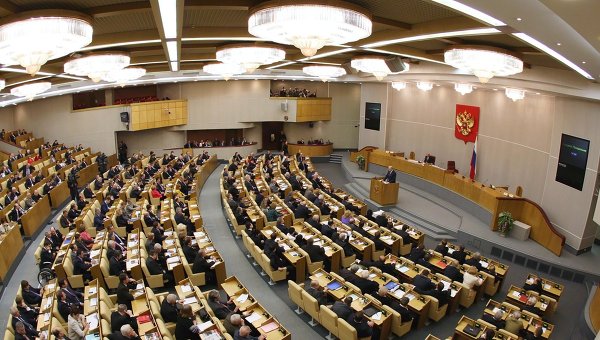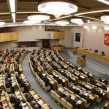
Russian Duma Backtracks on Direct Regional Elections
Publication: Eurasia Daily Monitor Volume: 10 Issue: 25
By:

United Russia brought a bill before the Duma for a first reading on January 23, 2013, that would permit regional legislatures to cancel direct gubernatorial elections for the “multi-ethnic” regions of Russia. Instead, parties in regional legislatures would pick three candidates each and present them to the president of the Russian Federation, who would select the winner. Under the plan, the republics themselves would be given the ability to decide whether they needed to cancel elections (https://www.bfm.ru/news/2013/01/23/gd-v-pervom-chtenii-otmenila-vsenarodnye-vybory-gubernatorov.html#.URGDkmeESSo). Direct gubernatorial elections, canceled in 2005 in the wake of the Beslan school hostage tragedy, were reinstated in April 2012 as a response to protests demanding greater democracy in Russia. So far, five regions carried out elections in October 2012: the Amur, Bryansk, Belgorod, Novgorod and Ryazan. In Bryansk and Ryazan, the ruling United Russia candidates were believed to be in danger of losing to challengers, but Nikolai Denin held on in Bryansk (https://www.interfax-russia.ru/Center/news.asp?id=352337&sec=1671) and Oleg Kovalev won in Ryazan (https://newsland.com/news/detail/id/1055902/). The fact that these elections were believed to be close, however, may have convinced the Kremlin that curtailing democratization where possible would be prudent.
The bill to remove direct gubernatorial elections was introduced by a group of United Russia deputies, but drew support from the Gennady Zyuganov (Communist Party), Vladimir Zhirinovsky (Liberal Democratic Party) and Sergei Mironov (A Just Russia) factions (410 of 450 deputies) on its first reading (https://www.echo.msk.ru/blog/nemtsov_boris/997142-echo/). The bill has also been endorsed by Vladimir Putin after initial reluctance to make a definitive motion for or against the bill. The rationale for the bill is that direct elections may cause destabilization in the ethnic republics if ethnic voters in the regions were permitted to vote along kinship lines. Some authorities and observers fear that elections may provoke a struggle among clans and massive fights along ethnic lines (https://vz.ru/politics/2013/1/23/617122.html). Critics have argued that the bill is poorly designed, being far too sweeping in its scope. Because it proposes to treat all ethnic republics in the same manner, it is not sensitive to regional differences. The “one size fits all” approach comes despite the fact that the possibility of ethnic destabilization is much higher in ethnically fragmented republics like Dagestan or Kabardino-Balkaria (where groups are relatively balanced in terms of size and power) than in mono-ethnic republics like Ingushetia or Chechnya. Inter-ethnic relations in Russia have been particularly prominent recently. Illustratively, ethnic Russian nationalists in Stavropol Krai called for their region to be disassociated from the North Caucasus Federal District (see EDM, February 4).
Many provisions included in the bill await further clarification, such as the question of which regions would be determined as “multi-ethnic.” After all, the hitherto mostly peaceful regions of Adygea, Bashkotostan, Buryatia, Chuvashia, Karelia, Komi, Mari-El, Mordovia, Sakha-Yakutia, Tatarstan, Tuva and Udmurtia have the formal status of ethnic republics and are indeed named for titular ethnic groups despite their multi-ethnic populations. The law could provide a pretext for the canceling of gubernatorial elections in these places, although it is unclear why the Kremlin would feel the need to considering that the ethnic republics have typically been the least competitive regions for non-United Russia candidates. Indeed, even in the majority-Russian areas, the bill could have an impact. For instance, a large number of ethnic minorities populate cities like Moscow and St. Petersburg and there is no guarantee that the provisions of the bill could not be interpreted in such a way as to prevent elections there. Some deputies, like A Just Russia’s Dmitry Gudkov, have seen in the bill a mechanism to allow unpopular United Russia governors to stay in power. In order to prevent this possibility, the leader of A Just Russia, Boris Mironov wants the bill limited only to regions where there are more than two nationalities that each make up more than 17 percent of the population (https://azerros.ru/maintheme/10029-pochemu-gosduma-hochet-otmenit-vybory-gubernatorov.html). Such a qualification would limit the chances of a serious inter-ethnic struggle breaking out in the regions.
Despite the many questions that remain unanswered over the content of the bill, the resistance to its passage remains limited. The largest opposition group is composed of ten Communist Party deputies, although there is also dissent from a few Liberal Democrat Party and even United Russia members. Communist deputy Anatoly Lokot, for instance, said the bill was “difficult to understand and even perplexing.” (https://www.interfax.ru/world/txt.asp?id=286661l). The extra-parliamentary opposition to the canceling of elections is led by Boris Nemtsov, who has stressed the peculiarity of canceling gubernatorial elections in regions that supported the Kremlin by margins of 90 percent in the 2011 parliamentary elections (https://www.echo.msk.ru/blog/nemtsov_boris/997142-echo/). More extreme critics of the legislation, such as St. Petersburg senator Vadim Tiolpanov, have argued that the canceling of regional elections “might even lead to the fall of our country” (https://www.rosbalt.ru/politrally/2013/01/24/1085484.html). While Tiolpanov’s point may be seen as alarmist, there is a danger to a system that lacks a basic sense of legitimacy—a legitimacy that genuine elections could provide. The fear is that the more Putin tries to manipulate the institutions of democracy to maintain his hold on power, the more irreparable the damage to the system becomes. With the number of available paths for legitimating the government becoming increasingly limited to free elections that the Kremlin cannot tolerate, it may already be too late to prevent Russia going the same way as the Soviet Union.




